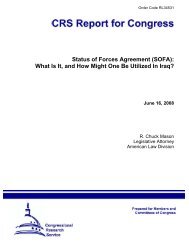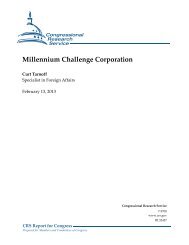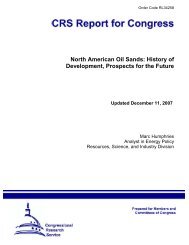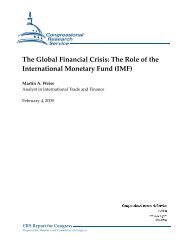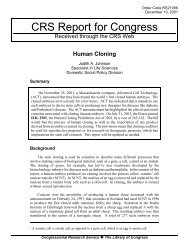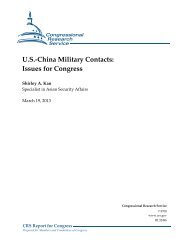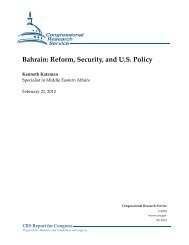The Proposed U.S.-South Korea Free Trade Agreement (KORUS ...
The Proposed U.S.-South Korea Free Trade Agreement (KORUS ...
The Proposed U.S.-South Korea Free Trade Agreement (KORUS ...
- TAGS
- korea
- fpc.state.gov
You also want an ePaper? Increase the reach of your titles
YUMPU automatically turns print PDFs into web optimized ePapers that Google loves.
CRS-3<br />
U.S. objectives, and <strong>South</strong> <strong>Korea</strong>n objectives. <strong>The</strong> report will be updated as events<br />
warrant.<br />
<strong>The</strong> <strong>KORUS</strong> FTA in a Nutshell<br />
<strong>The</strong> <strong>KORUS</strong> FTA was the product of much compromise. As negotiators from<br />
both countries stated, each country was able to accomplish some of its objectives, but<br />
neither side got everything it wanted. For example, <strong>South</strong> <strong>Korea</strong> made concessions<br />
in agriculture and services while the United States made concessions on rice and<br />
textiles. Yet, U.S. car manufacturers felt that <strong>South</strong> <strong>Korea</strong> did not go far enough in<br />
addressing barriers to auto imports and <strong>South</strong> <strong>Korea</strong> would have liked to have more<br />
U.S. concessions on trade remedies.<br />
Some highlights of the results of the agreement are provided below. Background<br />
information on a more detailed examination of the agreement’s provisions is<br />
provided in the main sections of this report.<br />
Agriculture<br />
Under the <strong>KORUS</strong> FTA’s agricultural provisions, <strong>South</strong> <strong>Korea</strong> immediately<br />
would grant duty-free status to almost two-thirds of current U.S. agricultural exports.<br />
Tariffs and import quotas on most other agricultural goods would be phased out<br />
within 10 years, with the remaining commodities and products subject to provisions<br />
that phase out such protection by year 23. Exports of seven U.S. products (skim and<br />
whole milk powders, evaporated milk, in-season oranges, potatoes for table use,<br />
honey, and identity-preserved soybeans for food use) would be subject to import<br />
quotas that slowly expand in perpetuity.<br />
Much effort went into negotiating provisions covering three agricultural<br />
commodities of export interest to the United States. Under the <strong>KORUS</strong> FTA, <strong>South</strong><br />
<strong>Korea</strong> agreed to eliminate its 40% tariff on beef muscle meats imported from the<br />
United States over a 15 year period. Also, <strong>South</strong> <strong>Korea</strong> would have the right to<br />
impose safeguard tariffs on a temporary basis in response to any potential surge in<br />
imports of U.S. beef meats above specified levels. However, negotiators did not<br />
reach a breakthrough by the end of the talks on the separate but parallel issue of how<br />
to resolve differences on the terms of access for all U.S. beef in a way that would<br />
address <strong>Korea</strong>’s human health concerns arising from the 2003 discovery of mad cow<br />
disease in the U.S. cattle herd. Sales of U.S. boneless beef from cattle aged less than<br />
30 months, though, did resume in April 2007 under the terms of a separate agreement<br />
reached in early 2006. However, <strong>Korea</strong>n inspectors’ discovery of prohibited cattle<br />
parts in some boxes of shipped beef that did not meet those terms in October 2007<br />
temporarily placed on hold retail sales of U.S. boneless beef. <strong>The</strong> new <strong>South</strong> <strong>Korea</strong>n<br />
president, seeking to remove this impediment to congressional consideration of the<br />
<strong>KORUS</strong> FTA, instructed his negotiators to resolve this longstanding bilateral dispute.<br />
On April 18, 2008, both countries reached an agreement that will allow sales in the<br />
<strong>Korea</strong>n market of boneless and in-bone U.S. beef from all cattle, irrespective of age,<br />
as long as risk materials known to transmit mad cow disease are removed. However,<br />
<strong>Korea</strong>n public concerns about the safety of U.S. beef and strong opposition to this



